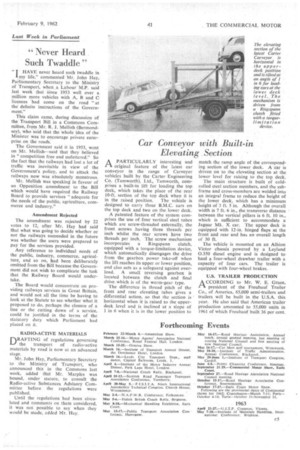"Never Heard Such Twaddle"
Page 37

If you've noticed an error in this article please click here to report it so we can fix it.
"I HAVE never heard such twaddle in
I my life," commented Mr. John Hay, Parliamentary Secretary to the Ministry of Transport, when a Labour M.P. said last week that since 1953 well over a million more vehicles with A, B and C licences 'had come on the road " at the definite instructions of the Government" This claim came, during discussion of the Transport Bill in a Commons Committee, from Mr. R. J. Mellish (Bermondsey), who said that the whole idea of the Minister was to encourage private enterprise on the roads.
The Government said it in 1953, went on Mr. Mellish—said that they believed in "competition free and unfettered." So the fact that the railways had lost a lot of traffic was inevitable in view of the Government's policy, and to attack the railways now was absolutely monstrous.
Mr. Mellish was speaking in favour of an Opposition amendment to the Bill which would have required the Railway Board to provide services "adequate for the needs of the public, agriculture, commerce and industry."
Amendment Rejected The amendment was rejected by 22 votes to 12, after Mr. Hay had said that what was going to decide whether or not the railways succeeded in the future was whether the users were prepared to pay for the services provided.
Any reference to individual needs of the public, industry, commerce, agriculture, and so on, had been deliberately omitted from the Bill because the Government did not wish to complicate the task that the Railway Board would undertake.
The Board would concentrate on providing railways services in Great Britain, and would not all the time be having to look at the Statute to see whether what it proposed to do, perhaps the closure of a line or the cutting down of a service, could be justified in the terms of the statutory duty which Parliament had placed on it.
















































































































